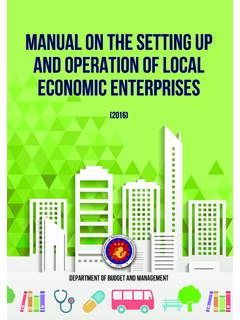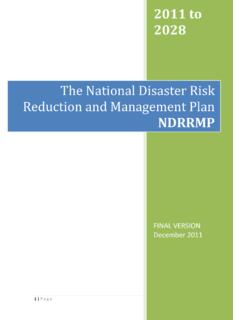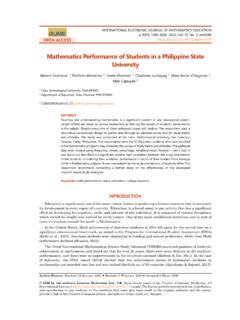Transcription of Experiences, perceptions and attitudes on ICT integration ...
1 International Journal of Education and development using Information and Communication Technology (IJEDICT), 2016 , Vol. 12, Issue 3, pp. 37-57. Experiences, perceptions and attitudes on ICT integration : A case study among novice and experienced language teachers in the Philippines John Paul Obillos Dela Rosa Dapdap High School and Philippine Normal University, the Philippines ABSTRACT The influence of Information and Communication Technology (ICT) in developing ways on how to better deliver instruction has been regarded as beneficial in education. In language teaching, the use of ICT is an impactful experience.
2 It is therefore the purpose of this study to delve into the experiences, perceptions and attitudes of a novice and an experienced language teacher about ICT integration in teaching English as a Second Language (ESL). Establishing similarities and differences on the experiences, perceptions , and attitudes of the subjects was further aimed in this research. Results revealed that the experienced language teacher had more exposure to ICT use than the novice teacher. However, the novice teacher makes use of more ICT-related materials and activities in her language class. Both teachers also have positive views on the impact of ICT on students overall learning and achievement.
3 Moreover, the novice teacher views ICT use as time-consuming and does call for a more knowledgeable manipulation of technological devices. The experienced teacher gives more favor to the advantages ICT contributes to language teaching, but views insufficiency of resources and services like limited Internet access as detrimental to effective ICT integration . On the other hand, both subjects also had positive attitudes towards ICT integration in English Language Teaching (ELT) and hoped that ICT use would later be strengthened in the Philippines. At the end of the paper, implications on the use of ICT in education and in language teaching among basic education institutions in the Philippines are presented.
4 Keywords: ICT integration ; Language Teaching; Experiences; perceptions ; attitudes ; Novice Teacher; Experienced Teacher. INTRODUCTION The advent of contemporary ways on delivering education has brought significant changes as to how the world views education and teaching. Globalization has made both teaching and learning intricate and the transformation in part has been driven by technological innovation (Tinio 2002). Technology has given society a wide array of choices, making a scarce resource abundant. With computers and Internet technologies, more people can now have access to available information more quickly, and make the world a reachable global village in just a snap of a finger.
5 Together with this technological revolution is the emergence of one of the most viable technological reforms in education, the use of Information and Communication Technology (ICT). ICT is considered at present as a potential tool that provides educational opportunities in both formal and non-formal ways. In the teaching-learning process, ICTs can increase learners motivation and engagement in classroom learning. It equips learners with digital age literacy, inventive thinking, higher-order thinking and sound reasoning, effective communication, and high productivity (Tinio 2002).
6 Hence, in the landscape of language teaching, ICT is considered as a powerful tool. According to Warschauer (2004), the simultaneous impact of globalization, the spread of English, and technological development have transformed the learning and teaching of English as a lingua franca in an unprecedented way. Thus, both English and ICT have become essential literacy skills for a growing number of non-native speakers of English to ensure full participation in the information society (Jung 2006). The use of ICT in the arena of modern language 38 IJEDICT education is no longer a choice, but a necessity that gives life to the different vistas on how language is effectively taught and learned.
7 Computer-Assisted Language Learning In the field of language learning, Computer-Assisted Language Learning (CALL) research has typically been enhancing input through technology, using technology to give effects on proficiency and achievement, providing feedback through technology, and integrating technologies (Zhao 2005). Chapelle (2001) considers CALL as an area of technology and second language teaching and learning even though revisions for the term are suggested regularly. For Beatty (2003), CALL encompasses issues of materials design, technologies, pedagogical theories, and modes of instruction.
8 Materials for CALL therefore include those which are purpose-made for language learning and those which adapt existing computer-based materials, videos, and other resources. The Internet and the rise of computer-mediated communication have reshaped the use of computers for language learning. The recent shift to global information-based economies means that students will need to learn how to deal with large amounts of information and should be able to communicate across languages and cultures. At the same time, the role of the teacher has changed as well. Teachers are not the only source of information any more, but effectively act as facilitators so that students can actively interpret and organize the information they are given, fitting it into prior knowledge (Dole, Duffy, Roeler, & Pearson 1991).
9 Students have become active participants in learning and are encouraged to be explorers and creators of language rather than passive recipients of it (Brown 1991). Integrative CALL stresses these issues and additionally lets learners of a language communicate inexpensively with other learners or native speakers. As such, it combines information processing, communication, use of authentic language, and learner autonomy all of which are of major importance towards exploring current language learning theories. In the research article of Lee (2000), he stated that network-based technology, which is one of the features of CALL, can contribute significantly to (1) experiential learning; (2) learner motivation; (3) enhanced student achievement; (4) authentic materials for study; (5) greater interaction; (6) individualization; (7) independence from a single source of information; and (8) global understanding.
10 Such tool has been very powerful in opening doors of educational opportunities for both teachers and learners who are in quest of support that could help them traverse the interlacing and challenging roads of the information superhighway. Studies on the integration of ICT in language teaching Jung (2006) investigated 591 Chinese university students in an in-land city in relation to their technology ownership, usage patterns, and levels of perceived ICT skills. Included in the research foci are their motivational orientations to learn English, their perceptions of English and technology, and their perceived benefits of and barriers to using ICT in learning English.
















